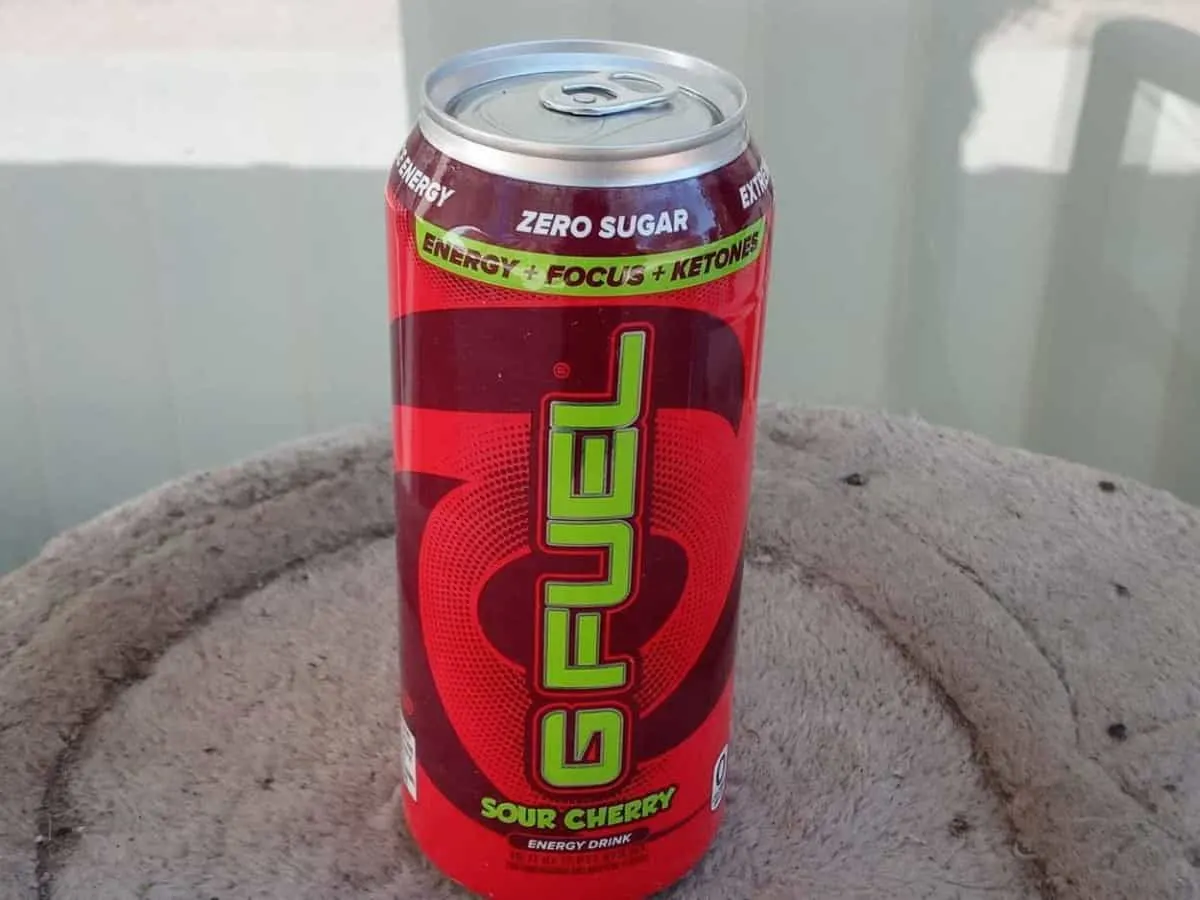I don’t know if you’ve already heard this, but G Fuel cans are very different from the original powder formula. That should come as no surprise considering the few differences between how cans and powder tubs work.
The same can be said for the needs they mean to meet but they still come from the same brand with several products.

For now, G Fuel cans contain 300mg of caffeine and made with artificial sweeteners, vitamins, and a handful of other ingredients, such as several energy-boosting substances and amino acids.
What unique substances do G Fuel cans have? What do they do and how can each serving do to your body?
Scroll down for a detailed analysis of the brand.
Contents
G Fuel Can Ingredients List

The list of ingredients are enumerated on the side of the can. They are the following.
- Carbonated Water
- Natural Flavors
- Artificial Flavors
- Sodium Gluconate
- Malic Acid
- Caffeine
- Potassium Beta-Hydroxybutyrate
- Maltodextrin
- Vitamin C
- Vitamin B3
- Vitamin B6
- Vitamin B12
- L-Tyrosine
- Sucralose
- Potassium Citrate
- Citric Acid
- Acesulfame Potassium
- Green Coffee Bean Extract
- Green Tea Extract
- Turmeric Extract
- Tart Cherry
- Blueberry
- Broccoli
- Kale
- L-Theanine
- Steviol Glycosides
How Much Caffeine is in a G Fuel Can?

G fuel has 300mg of caffeine per 16 fl.oz serving.
Caffeine is a stimulant that makes you alert and more awake during the day. Outside of energy drinks, you can find caffeine in coffee, tea, chocolates, and soft drinks as well. Caffeine works by blocking adenosine, which is a sleep hormone your body releases.
Adenosine relaxes the brain and makes you sleepy as time goes by, so blocking its receptors effectively will keep you awake. Caffeine also acts on your body very quickly; most people begin to feel its effects within a few minutes of consumption.
Unfortunately, caffeine is not without its side effects. The FDA states that 400mg is the most caffeine the average adult can consume daily. Going over this will make anyone more susceptible to experiencing the health consequences of too much caffeine.
The examples of the side effects of caffeine are:
- Insomnia
- Headaches
- Anxiety
- Irritability
- Palpitations (Fast heartbeat)
Sticking to the 400mg limit is usually the best way to avoid these side effects. Another way to do that is to make sure you don’t drink any source of caffeine too close to bedtime.
This is because caffeine takes 3-5 hours to reach half-life. Once it’s there, the amount in your bloodstream will only be half of what it originally was. After that, it’ll decrease more and more until it’s gone.
Potassium Beta Hydroxybutyrate in G Fuel Cans
Beta hydroxybutyrate (BHB) is a chemical your body produces to keep functioning when you don’t have enough carbohydrates and sugar in your system.
BHB can also be synthesized in a lab so it can be taken in supplements. It works by helping the nerves and brain work better.
Some believe BHB can also be used as fuel for muscle activity when the body is tired and can improve athletic performance because of that. However, there is insufficient evidence to back that claim as of the writing.
Maltodextrin in G Fuel Cans
Maltodextrin is a food additive that serves as flavoring, preservative, and texture (thickness) enhancer.
Maltodextrin is a common ingredient in packaged foods like pastries, candies, and soft drinks. Athletes also use maltodextrin as a carbohydrate supplement sometimes.
It’s made by processing any kind of starchy food including corn, wheat, potato, and rice.
Because of this, many assume that it’s not gluten-free because of the way it’s processed. Another is when a product is made out of wheat except it uses codex wheat or “gluten-free wheat starch” wherein gluten is washed out to a certain level safe for people with celiac disease.
Although it comes from sources most would consider healthy foods, Maltodextrin itself has no nutritional value however easy to digest and develops energy quickly.
Tyrosine in G Fuel Cans
Tyrosine is a chemical that promotes alertness just like caffeine does.
To be specific, Tyrosine is an amino acid the body naturally produces to assist in many functions. It creates neurotransmitters that help the brain function better and regulate mood.
Aside from being an ingredient in energy drinks like G Fuel, Tyrosine is also found in food.
Foods that contain Tyrosine are:
- Cheese
- Turkey
- Fish
- Dairy products
- Anything with lots of protein
Earlier, I mentioned that Tyrosine helps the body make neurotransmitters. It’s also responsible for making other hormones that are vital to other bodily functions like the fight or flight response.
The hormones and neurotransmitters produced through Tyrosine are:
| Hormone | Function |
| Dopamine | Manages the pleasure and reward centers. It’s also important for your memory and motor skills. |
| Adrenaline and Noradrenaline | Released during fight or flight reactions, preparing your body to either fight the perceived threat or run away from it. |
| Thyroid hormones | Regulates metabolism. Produced in the thyroid |
| Melanin | A natural pigment that gives your skin, eye, and hair color. The darker your complexion, the more melanin you have in your body. |
Artificial Sweeteners in G Fuel Cans
Artificial sweeteners in energy drinks are a sugar substitute. G Fuel cans use Sucralose and Acesulfame Potassium.
Artificial sweeteners are commonly used to reduce the sugar content in food products (without taking away its sweet taste). There are many reasons why this happens.
Many brands use artificial sweeteners to make their products more appealing to people who either can’t eat sugar or want to diet. This is because of artificial sweeteners being several times sweeter than table sugar and adding very few calories to the foods they’re used on.
Although many question the safety of artificial sweeteners even in the present, they’re considered safe by FDA standards.
If you want a deeper explanation of what artificial sweeteners are, their history, and the studies surrounding them, here’s a video for your reference. The video gives a short but focused discussion on what artificial sweeteners are and the science surrounding them.
Potassium Citrate in G Fuel Cans
Potassium Citrate is a mineral that’s important for heart health.
In food, potassium citrate is used as a buffer. This is why it’s often found in soft drinks and energy drinks like G Fuel. It adjusts the acidity level of the beverage to make it safe to eat or drink.
When used as a medicine, potassium citrate is used to prevent the formation of kidney stones and treat other kinds of kidney diseases.
Since it’s also an electrolyte, it can also be used as a treatment for gouty arthritis. This is because potassium citrate can flush out the uric acid that causes gout.
As mentioned above, potassium citrate is also good for the heart since potassium in it triggers the signals that get the heart to squeeze blood to the rest of your body.
Given this fact, G Fuel can be be consumed even by those with a heart condition without worrying about its side effects.
Turmeric Extract in G Fuel Cans

Turmeric is a spice that comes from the Tumeric plant and is best known for being used to flavor Asian food (like curry). The root of the plant is also used to make medicine since it has a substance called curcumin.
Thanks to curcumin, turmeric can be used to treat diseases involving inflammation like osteoarthritis.
Other diseases and disorders where turmeric is used as treatment are:
- Hay fever
- Depression
- High cholesterol
- Some liver diseases
- Itching
Some people also believe that it relieves heartburn, improves memory skills, and a several other conditions. However, there aren’t enough studies to support these claims.
Theanine in G Fuel Cans
L-Theanine is an amino acid that helps you relax.
Theanine is usually found in green tea, black tea, and some mushrooms. It’s also available as a supplement in pill or tablet form. As a treatment, it’s believed to reduce anxiety, insomnia, and stress.
It also increases focus when paired with caffeine. According to a study, theanine and coffee (95mg of caffeine) were effective at making a group of students (young adults) focuses more during demanding tasks. The students who participated in the study noticed that they generally felt more focused and less tired.
Theanine also has a similar chemical structure to glutamate, an amino acid the body produces to transmit nerve impulses in the brain. This makes it good for boosting the consumer’s cognitive function (memory and thinking skills).
Other health benefits of theanine include:
- Stronger immune system
- Blood pressure management
- Anti-cancer effects
There are many other possible benefits to theanine like being a viable treatment for diarrhea caused by cancer, but there’s not enough evidence to support any of that yet.
Steviol Glycosides in G Fuel Cans
Steviol Glycosides are natural sweeteners derived from the Stevia rebaudiana (Bertoni) plant, which can be found in South America. Its leaves have been used in food and medication for hundreds of years and in the present, the leaves and crude extracts are available on the market as dietary supplements.
Stevia sweeteners are made by extracting the steviol glycosides from the leaves and purifying them. This removes the bitterness in the crude extracts and makes them more appealing to consume.
Like sucralose, stevia sweeteners aren’t absorbed by the gastrointestinal tract. Thanks to that, they don’t add calories to the foods they’re used to or affect the blood sugar levels of the people who consume them.
Also like the artificial sweeteners mentioned above, steviol glycosides are considered safe to consume by the FDA.
Final Thoughts
G Fuel cans have 300mg of caffeine, artificial sweeteners, a natural sweetener, and several chemicals and amino acids that also help boost your energy and cognitive functions.
In my opinion, though it’s not as “healthy” as its powdered formula but it’s still a good option for people who really want that extra push. 300mg of caffeine in a G Fuel can is more than enough for that and if managed properly, shouldn’t cause any health problems.
That said, if you do decide to take this drink often then I’d really recommend knowing your limits first. G Fuel cans might not have any sugar to consider together with the caffeine, but that’s not a reason to go wild.
Moderation is the key. Compared to G Fuel Powder, G Fuel Cans aren’t something I can honestly recommend drinking any more often than you have to.
A single can or serving every now and then should be fine, but drinking G Fuel every day isn’t a good idea if you’re diagnosed with severe heart disease or are caffeine-sensitive.
As such if you’re a minor, pregnant, nursing, or caffeine-sensitive, then maybe you’ll be better off with the powdered version (which only has 150mg of caffeine per serving), or something else entirely caffeine-free.
